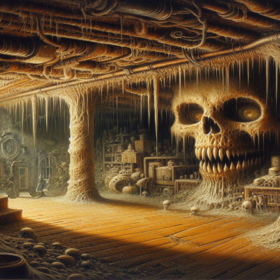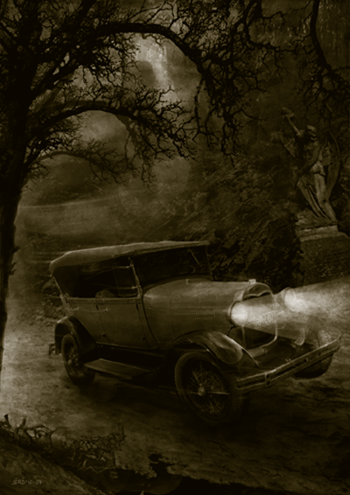See Page XX, Trail of Cthulhu
Stories of Another Time and Place: The Importance of Getting it Right
[Editors’ Note: Victor Raymond acted as a cultural consultant on Trembling Giant, an adventure for Out of the Woods, our forthcoming collection for Trail of Cthulhu.
Victor J. Raymond, PhD, is a sociologist, writer and longtime gamer. A founding member and Secretary of the Board of Directors of the Carl Brandon Society, which works to increase racial and ethnic diversity in the production of and audience for speculative fiction, he is also the chair of the Tekumel Foundation. He resides in Madison, Wisconsin.]
We live in a world awash in information. This simple fact has wrought a profound change in how we know things. It used to be that doing research involved a careful search of a limited number of volumes, stored in a library for precisely that purpose. Now, the information available through your phone far exceeds what a scholar of the 1970’s would have access to. But this presents everyone in industrial and post-industrial societies with an entirely different set of problems related to knowing anything – anything at all. Information by itself is not “knowledge” – no more so than a bunch of facts assembled together constitute evidence for anything. Rather than having to be carefully trained in making the most of the information we might have limited access to, instead we are confronted with a veritable white-out of data. Making sense of all of that data – including how to tell when we might not have all of the information we might need – is an epistemological challenge of daunting proportions. Yet, anyone writing fiction – particularly fiction dealing with real circumstances and historical events – must end up facing this problem head-on.
In John Birmingham’s alternate history novel, Weapons of Choice, first published in 2004, there is a scene in which two U.S. Navy seamen talk about Girl Guide cookies and whether or not they might get some during mail call. It’s a great moment, but it also happens to be incorrect; there are no “Girl Guides” in the United States – there are Girl Scouts, who have been selling cookies since 1917. It would be easy to say that a few minutes research on the Internet would have solved that mistake – but it’s still there. Birmingham is a best-selling Australian author, so he might be excused for making the mistake – but it got past his U.S. editor at Ballantine Books, as well.
I doubt that Birmingham didn’t do any research. In fact, I am sure he did a lot of research – he has said as much in various online forums and communities about his work. However, it’s a small but telling mistake in detail like this which can threaten the reader’s suspension of disbelief. In the past, if an author got something incorrect, the chance of discovery would depend on the scale of the mistake and the accessibility of information necessary to correct it. Now, it is possible that an error like the one in Weapons of Choice will be caught quickly – and, if sufficiently problematic – have an immediate and negative effect.
But it is one thing to find out that “Girl Guides” are known as the “Girl Scouts” in the United States, and another thing altogether attempting to write realistically about completely different social and historical contexts. While some have suggested that writers must only write about “what they know” this implies that it is impossible to transcend those differences (and such advice is particularly unrealistic for the science fiction and fantasy author). This perspective is too restrictive, and also does not recognize that individual writers are themselves not all cut evenly out of a single cultural cloth. For example, Kazuo Ishiguro’s third novel, The Remains of the Day, is regarded as a compelling depiction of human frailty and social expectations – but this ought not be surprising. Ishiguro’s family background is Japanese, but he himself grew up in the United Kingdom since the age of six. This mixture of cultural backgrounds is increasingly common in a world drawn closer together through travel, immigration, and technology. But not every writer has that background or range of perspective.
So what is a writer supposed to do, in this modern age, to tell a convincing story set in another place and time? When a writer is working with societies and cultures quite different from their own personal background and heritage, they must turn to other sources to back up their creative work. For a fantasy or science fiction author, the very fact that such cultures and backgrounds can be made up out of whole cloth might provide a certain amount of shelter from criticism. But this is a two-edged sword, since invented cultures and societies need to be believable on their own merits, just as much as depictions of real societies must meet certain standards of veracity. John M. Ford, in his tour de force Star Trek novel, The Final Reflection, recognized this in the “Translator’s Note” at the beginning of the book:
“An old Italian proverb runs traduttore, traditore: the translator is a traitor. And it is nowhere more true than when translating between races from different stars; still, I have tried to speak as little treason as possible. For clarity’s sake, certain klingonaase technical terms have been translated as their Federation Standard equivalents: thus warp drive, transporter, disruptor, instead of the more literal anticurve rider, particle displacer, vibratory distructor (most literally: the “shake-it-till-it-falls-apart-tool”).”
Other authors, notably Ursula K. Le Guin, Samuel R. Delany, and Nalo Hopkinson, have also recognized this challenge, and worked to ensure that they not only write believably about what they know – but also about places and times that are magical and different, and yet feel real to the reader. But even so, sometimes it doesn’t work. In Jo Walton’s alternate history novel, Farthing, set in a post-war Great Britain at an uneasy peace with Hitler’s Germany, small errors jeopardize the believability of the otherwise excellent writing. The make of cars driven by some of the characters; where certain towns are located; certain details about parliamentary procedure; even details of coinage – these all conspire against the verisimilitude of the story itself. So there is no sure way to avoid making mistakes; the author needs to be on constant watch for believability, while knowing that errors will creep in.
In the context of a role-playing game, the problem of “getting it right” is made more complicated by fluid nature of gaming itself. Mistakes which might jar a reader out of a written story might be more easily glossed over in the descriptions provided to the players during the course of a game session. Indeed, it might seem easiest to provide relatively little background detail, trusting to the players’ imaginations to fill in the various gaps. Such an approach is much more problematic than many game masters realize, creating an on-going risk in the game they are running on several different levels. The first level is simply that there is no assurance that players will know very much about the setting or place, and the game gets shaped more by stereotypes and misconceptions than anything else. The second level of problem is that it becomes easier to see “behind the stage flats” as the culture and milieu end up lacking depth. The third level of problem is that the game itself ends up lacking that sense of sub-creation which Tolkien wrote about in his essay On Fairy Stories: it ends up being not strange enough, rather than too strange. All of this is complicated by the nature of role-playing games partaking of both story-telling and dramatic improvisation.
To add to the creative tension in writing for role-playing games, differences between cultures are especially important. When you are working within a social context of different cultures such as those of Native American tribes of North America, “getting it right” means stepping away from stereotypes and overly simplistic explanations. In particular, it becomes necessary to keep in mind the colonial legacy of European colonization of the Western Hemisphere, and the cultural appropriation which is embedded deeply in contemporary popular media, especially in role-playing games. If possible, the author needs to write believably about both white and Native cultures, as well as any other more fantastic cultural elements required by the fictional milieux of the game. Therein lies the rub.
If accurately depicting cultural differences themselves were the only test faced by the author, that would be challenge enough. But we’re not done; the Cthulhu Mythos itself presents a requirement of fidelity to the source material. Striking the balance between differences between actual cultures while at the same time introducing elements of weird horror is difficult enough for the writer; “getting it right” becomes a perilous balancing act – and yet absolutely necessary to make role-playing believable. It is a Gordian Knot, not easily cleft in twain by the author, the game master, or the players – but the reward is in new and unexpected revelations and insights which can enrich the experience immeasurably when the game is actually played.



